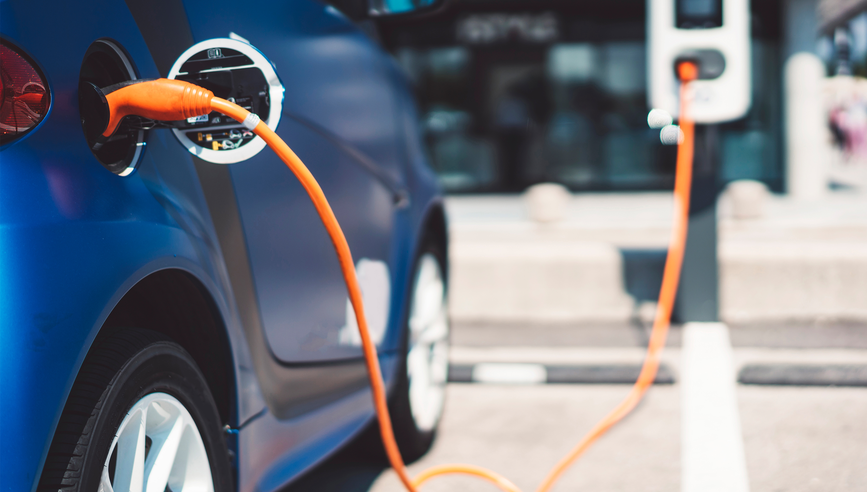Electric Cars and Hybrid Cars: Pros and Cons


Electric and hybrid cars are becoming more mainstream as studies are showing that these vehicles offer benefits of improved fuel economy, lower fuel costs and reduced emissions.1 If you’re contemplating an electric vehicle (EV) or a hybrid car for your next car purchase, you should consider the pros and cons of buying a car that’s not your traditional vehicle.
Here’s a look at some of the advantages and disadvantages of electric and hybrid vehicles.
How electric cars and hybrids work
The “electric cars and hybrids” vehicle category includes electric, hybrid and plug-in hybrid electric vehicles.
Electric cars differ from traditional vehicles in that they’re powered by electric motors, not internal combustion engines. Each vehicle depends on a large traction battery pack that stores electrical energy, which in turn powers the electric motor. The electric car gets charged by an “off-board” power source when it’s plugged in to a charging station or wall outlet.2
During driving, regenerative braking might also charge an electric car. This means that when the driver brakes, some of the energy that would typically be lost during braking generates electricity that powers the vehicle.3
Electric cars don’t need liquid fuel such as gasoline or diesel. They also don’t need fuel equipment, such as a fuel pump, line or fuel tank.4
Hybrid vehicles use battery power to supplement a traditional internal combustion engine and do not need to be plugged into anything to charge. Instead, the battery gets charged by a combination of the internal combustion engine and regenerative braking.5
Plug-In Hybrid Electric Vehicles (PHEVs) come equipped with an internal combustion gas engine as well. These cars need liquid fuel because they run on electricity until their batteries run out, then switch to the gas engine.6
Pros of electric and hybrid cars
Saving money on fuel
Do you really save money with an electric or hybrid car? Although the hefty startup costs fall under the “cons” category for electric and hybrid cars, these vehicles generally cost less to run over time due to lower (or no) fuel costs.7
Environmental considerations of EVs
Hybrid and electric vehicles can have emissions benefits over conventional vehicles, depending on the type of vehicle you choose.8 The emissions benefits of hybrid electric vehicles vary by vehicle model and type of hybrid power system, while EVs typically produce zero tailpipe emissions and PHEVs typically produce no tailpipe emissions when driven in all-electric mode.
You may get a tax break
Federal and provincial governments across Canada are encouraging the purchase of electric and plug-in hybrid vehicles with various rebate incentives. Make sure to check to see what’s available in your area.9
Insurers may give you a discount
Buying an electric or hybrid vehicle may lead to savings on your car insurance costs. Ask your broker if there are auto insurance discounts available to you.
Cons of electric and hybrid cars
Shorter range
Consumers who may have “range anxiety,” or the fear of running out of charge while on the road, may now find their concerns alleviated by larger batteries and growing access to charging stations. Most electric vehicles today can travel 200 – 400 km on a single charge.10
It’s also important to understand that driving conditions – including hot and cold weather – as well as how you drive your vehicle, may impact the driving range of electric and hybrid vehicles.11
PHEVs typically have ranges of about 20 – 80 km when just using battery power. However, they can also switch over to an internal combustion engine (running on liquid fuel such as gasoline), when the battery is depleted.12
Higher upfront cost
Typically, electric cars have a higher upfront cost than traditional internal combustion vehicles or hybrid vehicles. Initial costs may be offset by fuel cost savings over time, as well as federal and provincial tax credits.9
Should I buy an electric car?
If you’re considering going with an electric or hybrid car for your next vehicle, research your options carefully. Think about how an electric car would impact your life on a daily basis. For example, do you know where the charging stations are in your area and how often you might need them? Take the time to gather information and review your data can help you make a wiser buying decision. Here are a few extra things to consider:
Charging your electric car
How long does it take to charge an electric or hybrid car? It’s a simple question with a not-so-simple answer. The length of time it takes to charge an electric car depends on the amount of charge required – and the type of charging available.
Today’s electric car drivers have the option to charge their vehicles by plugging the vehicle’s charger into the electrical power grid at home, work or at public charging stations. The three main types of chargers include:
- Level 1 charging through a 120V AC plug, typically found in private and public buildings. Every hour charged delivers approximately 8 km of driving range.13
- Level 2 charging through a 240V (household) or 208V (commercial) plug that must be specially installed; this also requires specialty charging equipment. A level 2 electric car charging delivers about 30 km of driving per hour of charge.13
- DC fast charge uses specialized high-powered charging equipment, plus requires specialized equipment within the electric car as well. One hour of charging delivers 250 km of driving range.14
Therefore, the amount of time required to charge an electric car varies. If the battery gets completely drained, it could take anywhere from 20 minutes (with a “DC Fast Charge”) to more than 20 hours (with level 1 charging) to fully charge the car.15
Consider purchasing a used hybrid
If you can’t afford a new hybrid, consider buying a used one. You can do research online to find a service that provides vehicle history reports, to track service records and rule out vehicles that have performed poorly.
Once you’ve made your decision about the car you’d like to buy, consider your insurance options. Check out Travelers car insurance and contact your insurance broker to make sure you have the coverage you need.
Sources
1 Government of Canada - https://natural-resources.canada.ca/energy-efficiency/transportation-alternative-fuels/personal-vehicles/choosing-right-vehicle/buying-electric-vehicle/21034
2,3 U.S. Department of Energy, https://afdc.energy.gov/fuels/electricity_basics.html
4 U.S. Department of Energy, https://afdc.energy.gov/vehicles/how-do-all-electric-cars-work
5 U.S. Department of Energy, https://afdc.energy.gov/vehicles/how-do-hybrid-electric-cars-work
6 U.S. Department of Energy, https://afdc.energy.gov/vehicles/how-do-plug-in-hybrid-electric-cars-work
7, Plug ‘N Drive - https://www.plugndrive.ca/electric-vehicle-benhefits
8 – Government of Canada - https://natural-resources.canada.ca/energy-efficiency/transportation-alternative-fuels/personal-vehicles/choosing-right-vehicle/buying-electric-vehicle/21034
9 Plug ‘N Play - https://www.plugndrive.ca/electric-vehicle-incentives/
10 Plug ‘N Play - https://www.plugndrive.ca/electric-vehicle-range/
11 Driving.ca - https://driving.ca/features/winter-driving/canadian-winter-driving-electric-vehicles
12 Plug ‘N Play - https://www.plugndrive.ca/electric-vehicle-types/
13 Plug ‘N Play - https://www.plugndrive.ca/guide-ev-charging/
14 Plug ‘N Play - https://www.plugndrive.ca/public-charging/
15 Canada Drives - https://www.canadadrives.ca/blog/car-guide/how-long-does-it-take-to-charge-an-electric-vehicle


